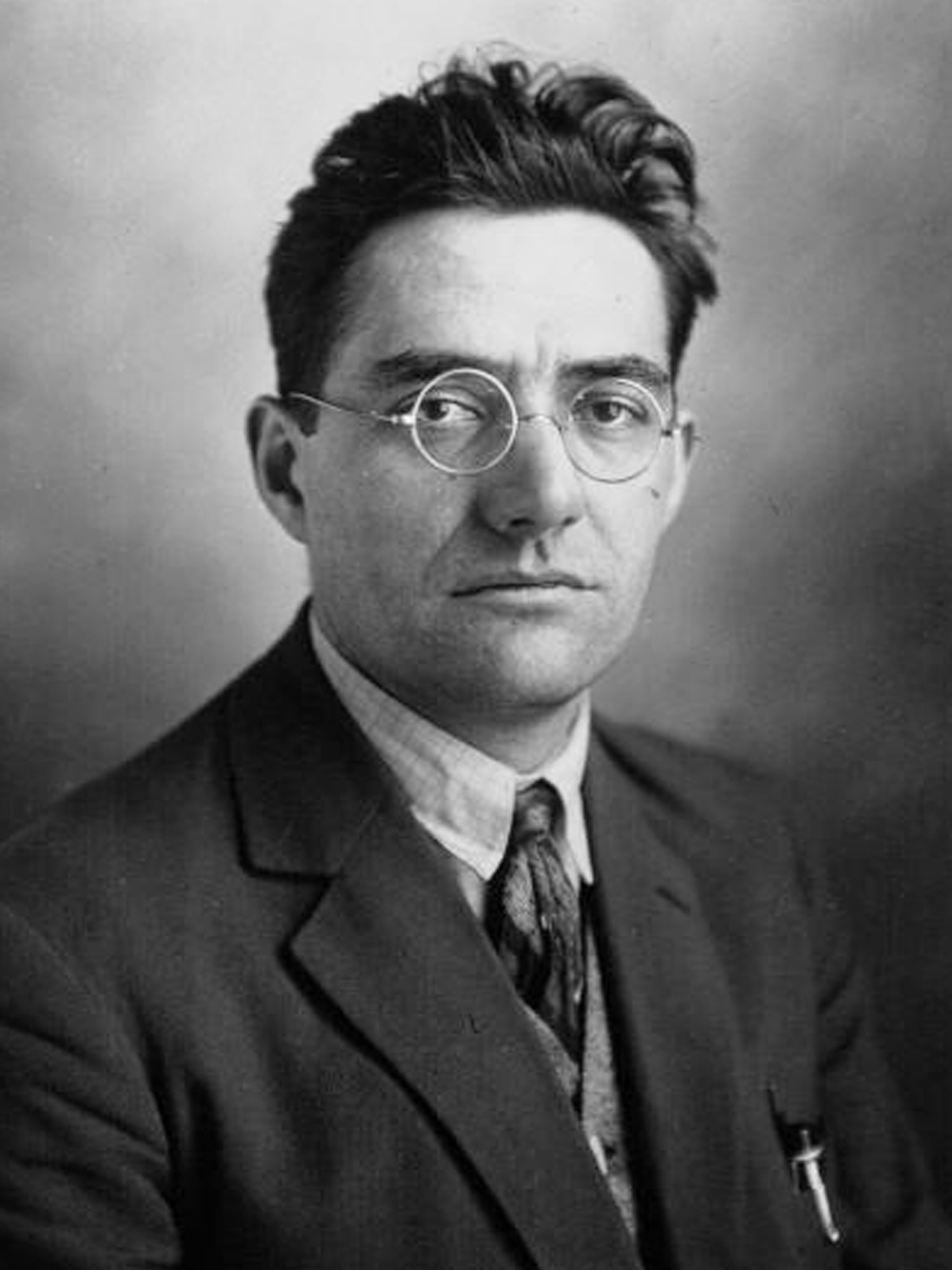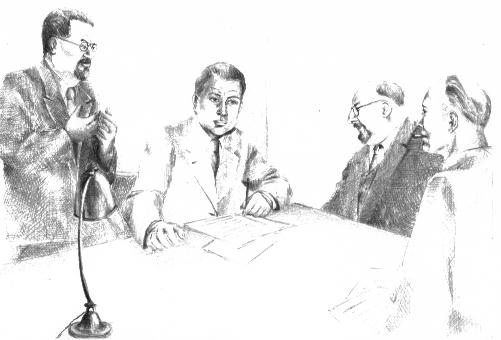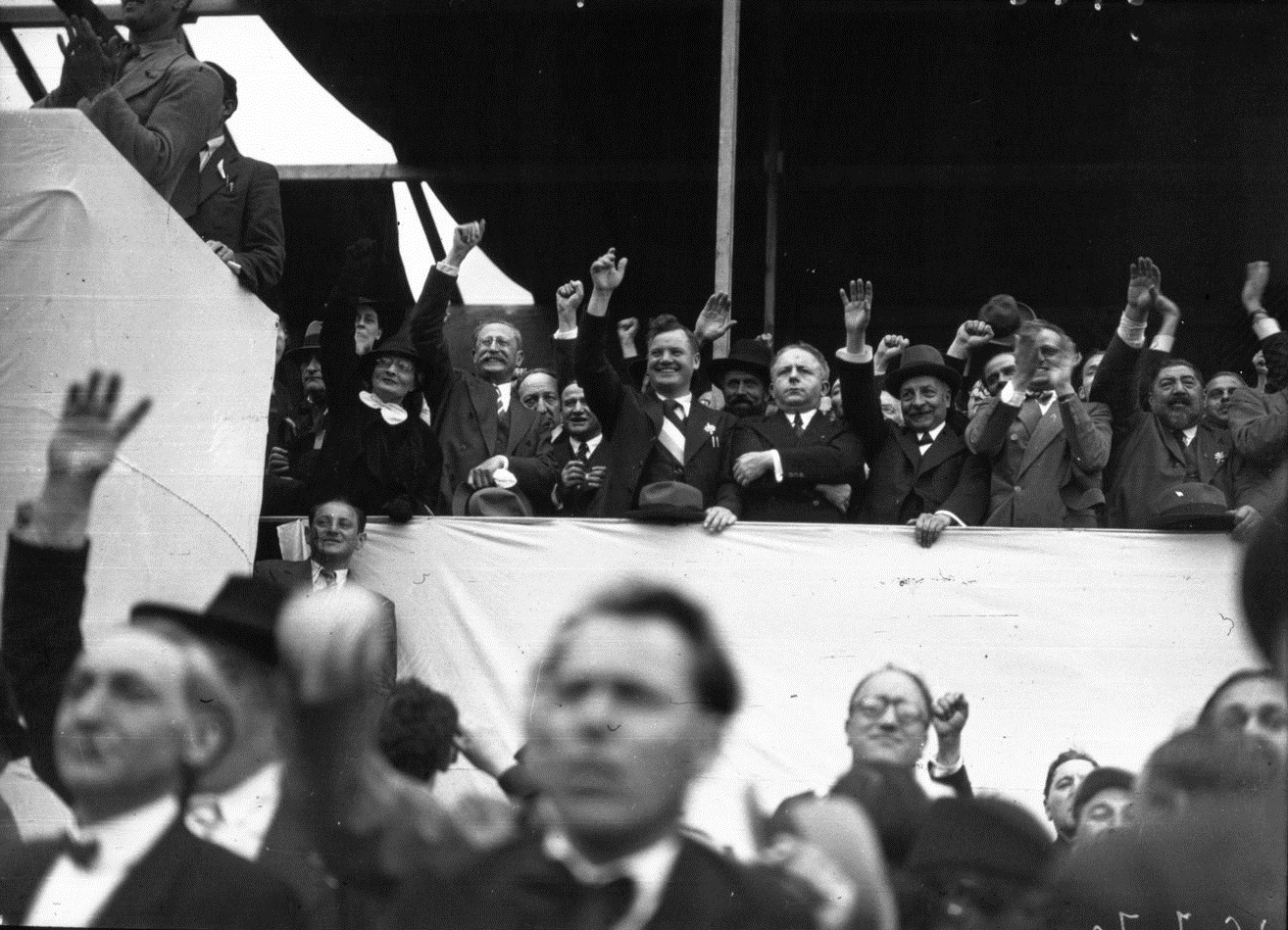|
Eugen Fried
Eugen Fried (13 March 1900 – 17 August 1943) was a Czechoslovak communist who played a leading role in the French Communist Party in the 1930s and early 1940s as the representative of the Communist International. He ensured that the party leaders were loyal to Joseph Stalin and followed the instructions of Moscow. He was ruthless but discreet, and stayed out of the public eye. Life 1900–21: Early years Eugen (Jenő) Fried was born on 13 March 1900 in Trnava, in what is now eastern Slovakia, to a family of Jewish small traders. He was a gifted student, and graduated from secondary school in 1917. He started to study chemistry at the University of Budapest but was unable to graduate due to the collapse of Austria-Hungary in 1918. He joined the Bolsheviks and from March to July 1919 participated in the revolution of Béla Kun that established the Hungarian Soviet Republic. When the republic collapsed he took refuge in the new country of Czechoslovakia. 1921–29: Communist Party ... [...More Info...] [...Related Items...] OR: [Wikipedia] [Google] [Baidu] |
Trnava
Trnava (, german: Tyrnau; hu, Nagyszombat, also known by other alternative names) is a city in western Slovakia, to the northeast of Bratislava, on the Trnávka river. It is the capital of a ''kraj'' (Trnava Region) and of an ''okres'' (Trnava District). It is the seat of a Roman Catholic archbishopric (1541–1820 and then again since 1977). The city has a historic center. Because of the many churches within its city walls, Trnava has often been called "Little Rome" ( sk, Malý Rím, la, parva Roma), or more recently, the "Slovak Rome". Names and etymology The name of the city is derived from the name of the creek Trnava. It comes from the Old Slavic/Slovak word ''tŕň'' ("thornbush")Martin Štefánik – Ján Lukačka et al. 2010, Lexikón stredovekých miest na Slovensku, Historický ústav SAV, Bratislava, 2010, p. 523, . http://forumhistoriae.sk/-/lexikon-stredovekych-miest-na-slovensku which characterized the river banks in the region. Many towns in Central Europe h ... [...More Info...] [...Related Items...] OR: [Wikipedia] [Google] [Baidu] |
Dmitry Manuilsky
Dmitriy Manuilsky, or Dmytro Zakharovych Manuilsky ( Russian: Дми́трий Заха́рович Мануи́льский; Ukrainian: Дмитро Захарович Мануїльський; October 1883 in Sviatets near Kremenets – 22 February 1959 in Kiev) was an important Bolshevik revolutionary, Soviet politician and academic who was Secretary of the Executive Committee of Comintern, the Communist International, from December 1926 to its dissolution in May 1943. Life Background Manuilsky was born to a peasant family of an Orthodox priest in Kremenets. After secondary school, he enrolled at the University of St. Petersburg in 1903, and joined the Bolshevik faction of the Russian Social Democratic Labour Party in 1904. During the 1905 revolution he was assigned by the Bolsheviks to the naval base in Kronstadt where he took part in the naval revolt in July. Arrested, he was held in Kronstadt prison in 1905-06, then exiled, but escaped, arriving in Kiev and then, in ... [...More Info...] [...Related Items...] OR: [Wikipedia] [Google] [Baidu] |
Jacques Doriot
Jacques Doriot (; 26 September 1898 – 22 February 1945) was a French politician, initially communist, later fascist, before and during World War II. In 1936, after his exclusion from the Communist Party, he founded the French Popular Party (PPF) and took over the newspaper '' La Liberté'', which took a stand against the Popular Front. During the war, Doriot was a radical supporter of collaboration and contributed to the creation of the Legion of French Volunteers against Bolshevism (LVF). He fought personally in German uniform on the Eastern Front, with the rank of lieutenant. Early life and politics Doriot moved to Saint Denis, near Paris, at an early age and became a labourer. In 1916, in the midst of World War I, he became a committed socialist, but his political activity was halted by his joining the French Army in 1917. Participating in active combat during World War I, Doriot was captured by enemy troops and remained a prisoner of war until 1918. For his wartime servi ... [...More Info...] [...Related Items...] OR: [Wikipedia] [Google] [Baidu] |
Maurice Tréand
Maurice Tréand (21 September 1900 – 26 January 1949) was a French communist leader who was responsible for vetting party members in the period leading up to world War II (1939–45). During the early part of the war, before the German invasion of the Soviet Union, he may have been indiscreet in discussions with the German occupiers of France. He was excluded from underground operations after the Communists became active in the French Resistance following the June 1941 German invasion of the Soviet Union. Early years Maurice Tréand was born in 1900. He joined the French Communist Party (PCF, ''Parti communiste français''), and from 1932 was in charge of the security of the PCF leaders, and of underground operations. Early in 1933 he was made secretary of the PCF's Cadre Commission. The Cadre Commission (''commission des cadres'') was set up to "verify" comrades and ensure "that a thing was what it was supposed to be" – to root out informers and politically unreliable members. ... [...More Info...] [...Related Items...] OR: [Wikipedia] [Google] [Baidu] |
André Marty
André Marty (6 November 1886 – 23 November 1956) was a leading figure in the French Communist Party (PCF) for nearly thirty years. He was also a member of the National Assembly, with some interruptions, from 1924 to 1955; Secretary of Comintern from 1935 to 1943; and Political Commissar of the International Brigades during the Spanish Civil War from 1936 to 1938. Early years Marty was born in Perpignan, France, into a left-leaning but comfortable family; his father was a wine merchant. As a youngster, Marty tried to win a place in open competition for the prestigious École Navale, the French naval academy, but failed and instead became apprenticed to a boiler maker. He later joined the French navy, becoming a mechanical engineering officer aboard the battleship ''Jean Bart''. In April 1919, the ''Jean Bart'' and another dreadnought, the ''France'', were sent to the Black Sea to assist the White Russians in the Russian Civil War. Black Sea mutiny On 19 April 1919, the c ... [...More Info...] [...Related Items...] OR: [Wikipedia] [Google] [Baidu] |
Benoît Frachon
Benoît Frachon (13 May 1893 – 1 August 1975) was a French metalworker and trade union leader who was one of the leaders of the French Communist Party (''Parti communiste français'', PCF) and of the French Resistance during World War II (1939–45). He was Secretary-General of the ''Confédération générale du travail'' (CGT) from 1945 to 1967. 1893–1914: Early years Benoît Frachon was born on 13 May 1893 in Le Chambon-Feugerolles, Loire, the third of five children in a working-class family. Le Chambon-Feugerolles was a mining and industrial town in the Loire coal basin. His father was a miner who died of uremia at the age of 51. Benoît received a Certificate of Primary Education in July 1904. He went on to secondary school in Chambon-Feugerolles, but dropped out two years later. At the age of thirteen he became apprenticed to a former metal worker, who taught him the basic skills. When Frachon's father died he obtained work with a manufacturer of bolts and other hardwa ... [...More Info...] [...Related Items...] OR: [Wikipedia] [Google] [Baidu] |
Jacques Duclos
Jacques Duclos (2 October 189625 April 1975) was a French Communist politician who played a key role in French politics from 1926, when he entered the French National Assembly after defeating Paul Reynaud, until 1969, when he won a substantial portion of the vote in the presidential elections. Biography Born in Louey, Hautes-Pyrénées, Duclos fought in the Battle of Verdun, where he was wounded. He was captured at Chemin des Dames, and remained a prisoner of war for the remainder of the war. In 1920, he joined the newly formed French Communist Party. He rose to the Central Committee in 1926, and defeated Léon Blum in the elections for deputy in the 20th arrondissement. He was named head of the propaganda section of the Party in 1936, and was elected to Vice-President of the French National Assembly. A Stalinist, Duclos was for more than 35 years the brain behind political choices made by Maurice Thorez and Benoît Frachon. He was involved in the International Communist M ... [...More Info...] [...Related Items...] OR: [Wikipedia] [Google] [Baidu] |
Maurice Thorez
Maurice Thorez (; 28 April 1900 – 11 July 1964) was a French politician and longtime leader of the French Communist Party (PCF) from 1930 until his death. He also served as Deputy Prime Minister of France from 1946 to 1947. Pre-War Thorez, born in Noyelles-Godault, Pas-de-Calais, became a coal miner at the age of 12. He joined the French Section of the Workers' International (SFIO) in 1919 and was imprisoned several times for his political activism. After the 1920 split in the SFIO led to the formation of the French Communist Party (PCF) in December 1920, Thorez became party secretary in 1923 and, in 1930, general secretary of the party, a position he held until his death. After he took office as secretary general, he was supported by Soviet leader Joseph Stalin and the Communist Party of the Soviet Union. In 1932 Thorez became the companion of Jeannette Vermeersch; they had three sons before marrying in 1947, and remained married until his death. Thorez was elected t ... [...More Info...] [...Related Items...] OR: [Wikipedia] [Google] [Baidu] |
Pierre Célor
Pierre Célor (19 April 1902, Tulle, Corrèze – 6 April 1957) was a member of the French Communist Party from 1923, becoming one of the four secretaries of its Central Committee in 1929, beside Maurice Thorez and Henri Barbé. However, he fell into disgrace after the Comintern expelled him from the PCF and in 1942 he joined the Parti populaire français (PPF) of Jacques Doriot. After the Second World War, he was sentenced to seven years in prison for collaboration Collaboration (from Latin ''com-'' "with" + ''laborare'' "to labor", "to work") is the process of two or more people, entities or organizations working together to complete a task or achieve a goal. Collaboration is similar to cooperation. Most ... but was granted amnesty and was released in 1947. He participated in the anti-Communist review ''Est&Ouest'' and became close to traditional Catholics. Sources * Philippe Robrieux, ''Histoire intérieure du parti communiste'', T1 et T4, Fayard, Paris. ... [...More Info...] [...Related Items...] OR: [Wikipedia] [Google] [Baidu] |
Henri Barbé
Henri Barbé (14 March 1902, Paris – 24 May 1966, Paris) was a French Communist, and later, fascist politician. Life A metallurgical worker, at 15 he joined the Young Socialists. Attending the Third International, he naturally opted for the French Communist Party (PCF), at the split of the Congress of Tours. In 1926, he was promoted to secretary general of the Young Communists. In 1928, he was a member of the executive of the Comintern. In 1929, he replaced Pierre Sémard as head of the PCF, in a team which also included Maurice Thorez and Pierre Célor. In 1931, he was questioned in the course of a meeting of the BP (Bureau Politique), attended by Dmitry Manuilsky, Secretary of the Third International. Ejected from the BP (and replaced by Thorez) during case which was known as the Barbé-Célor affair. He took a long stay in Moscow and wrote a number of self criticisms. Returning to France, Barbé was eventually expelled from the Communist Party in 1934 for having "ul ... [...More Info...] [...Related Items...] OR: [Wikipedia] [Google] [Baidu] |
Trotskyist
Trotskyism is the political ideology and branch of Marxism developed by Ukrainian-Russian revolutionary Leon Trotsky and some other members of the Left Opposition and Fourth International. Trotsky self-identified as an orthodox Marxist, a revolutionary Marxist, and Bolshevik– Leninist, a follower of Marx, Engels, and 3L: Vladimir Lenin, Karl Liebknecht, and Rosa Luxemburg. He supported founding a vanguard party of the proletariat, proletarian internationalism, and a dictatorship of the proletariat (as opposed to the "dictatorship of the bourgeoisie", which Marxists argue defines capitalism) based on working-class self-emancipation and mass democracy. Trotskyists are critical of Stalinism as they oppose Joseph Stalin's theory of socialism in one country in favour of Trotsky's theory of permanent revolution. Trotskyists criticize the bureaucracy and anti-democratic current developed in the Soviet Union under Stalin. Vladimir Lenin and Trotsky, despite their ideolog ... [...More Info...] [...Related Items...] OR: [Wikipedia] [Google] [Baidu] |
Anarcho-syndicalism
Anarcho-syndicalism is a political philosophy and anarchist school of thought that views revolutionary industrial unionism or syndicalism as a method for workers in capitalist society to gain control of an economy and thus control influence in broader society. The end goal of syndicalism is to abolish the wage system, regarding it as wage slavery. Anarcho-syndicalist theory generally focuses on the labour movement. Reflecting the anarchist philosophy from which it draws its primary inspiration, anarcho-syndicalism is centred on the idea that power corrupts and that any hierarchy that cannot be ethically justified must be dismantled. The basic principles of anarcho-syndicalism are solidarity, direct action (action undertaken without the intervention of third parties such as politicians, bureaucrats and arbitrators) and direct democracy, or workers' self-management. Anarcho-syndicalists believe their economic theories constitute a strategy for facilitating proletarian self-ac ... [...More Info...] [...Related Items...] OR: [Wikipedia] [Google] [Baidu] |







